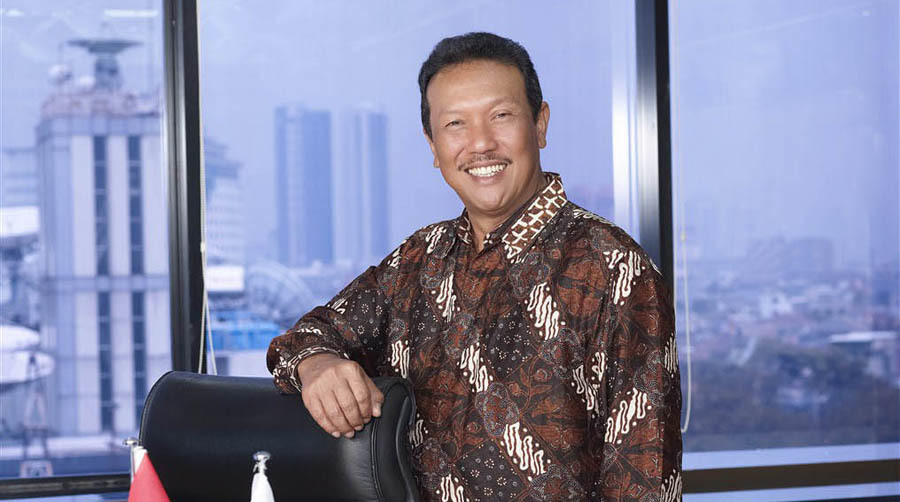
Danang S. Baskoro, the Managing Director of PT. Angkasa Pura 1 (Persero)
Angkasa Pura Airports (AP 1) initiated to conduct a National Seminar that carried a theme “Harmonisasi and Penyamaan Persepsi Pengelolaan Terminal Kargo dan Pos di Bandara” (Harmonization and Synergetic Perception of Cargo and Post Terminals Management in Airports) in Jakarta.
Moreover, to get complete pictures of the expectation and similar understanding about the management of cargo and post terminals at airports, especially about the authority limitation at the cargo and post terminals, Cargo Times (CT) interviewed Mr. Danang S. Baskoro (DSB), the Managing Director of PT. Angkasa Pura 1 (Persero), as an initiator of the national seminar.
CT: The purpose of the national cargo seminar was about to work as in Law Number 1/2009’s base about Aviation. And, what is actually the other purpose that make AP 1 want to manage all cargo and post terminals in 13 airports?
DSB: First, AP 1 realized of their role as one of the regionals growth drivers that will impact the National Economy. To become “One of The Best Ten Airport Operators in Asia”, AP 1 changes their business paradigms, from infrastructure provider to service company that orientate to the improvement on safety, security, and amenities quality for airport customers by using Smart Airport.
Secondly, in the Articles of Association, AP 1 implement the airport services as follows:
- Airside – Facility provision, effort, and development for PJP4U activities or Airplane Landing/Take Off Services, Parking, and Garages.
- Landside – Terminal’s Facility provision, effort and development for passenger’s transport services (PJP2U), cargo and post (PJKP2U).
- The Provision, Effort and Development of Electronic, Electricity, water and waste installation facilities.
- Land provision for activities that relate with air freight smoothness.
- Airport supporting activities (cargo and post management services, security services/avsec, provisions of stores, restaurants & bars, vehicles parking)
- Other supporting services (in airport zone).
By doing the activities above in 13 airports, AP 1 could build or run other companies that have relation with the businesses above, either individually or cooperatively as long as the companies that won’t conflict with the valid laws and correspond with the AP 1’s Articles of Association.(**)
CT: If the last national cargo seminar was right to the target and didn’t draw attention to each sector (panelists), which actually could be driven to the most authorized parties (the targets) such as Regulators, the Transportation Ministry, here means the Directorate Generalof Air Transportation? How would you comment on this?
DSB: The title of the seminar was about the Harmonization in Cargo and Post Terminals. However, there are no tips yet of how to realize the harmonization and cargo services at the airports. Each panelist is still talking about sectoral issues, yet they haven’t been comprehensively to unravel the best process of harmonization and synergic perception.
In my opinion, the party that may be able to start or initiate the harmonization process is the Government. If we only have to wait and ask each institution to do the harmonization, it seems difficult. And each of them will hold one’s own.
The core of the cargo seminar was actually no conflicts (harmonization), and each party has the same perception that the cargo services are part or based on the regulation Law Number 1/2009.
This only can be done by the most authorized institution or relatively it should be in the interest of one’s own. And the institution should be from the Government, here is the Transportation Ministry, precisely the Directorate General of Air Transportation.
CT: What kind of synergy that you wish from the Airport Corporate’s Partners (Privates) at the cargo and post terminals in relation with the Airport Related Services? We assumed (that) if AP 1 didn’t want to get “troublesome” because AP 1 have Angkasa Pura Logistics as the subsidiary. Is our assumption wrong? Do you have any better solutions?
DSB: As the purpose of the seminar was to build better synergy amongst institution (State-owned Corporate and Privates) of the national logistic providers, especially the air cargo service management, as it ismandated in President Regulation Number 6 Year 2012 about the National Logistic System (SISLOGNAS).
Your assumption is not wrong. It has been explained above. (read the answer Number 1**) However, in order to avoid the impression as a “possessor” that may be interpreted as to monopolize the management of cargo terminal and cause commotion, a better solution that is suitable with the spirit of SISLOGNAS is Collaboration (Synergy) between the Airport Corporate (AP 1) and their business partners to run the business or create new opportunities so that it will create professional partnership in providing services that relate to the management of cargo and post terminals at airports.
Menteri Perhubungan Dudy Purwagandhi menyampaikan hasil penyelenggaraan angkutan Lebaran 2025 pada Rapat Kerja dengan Komisi V DPR RI terkait Evaluasi
…DetailsJNE bersama Institut Pariwisata Trisakti (IPT) resmi melakukan penandatanganan kesepakatan kerjasama pada hari Selasa, 22 April 2025 di Auditorium IP Trisakti.
…DetailsJ&T Express, perusahaan logistik berskala global, membuka kesempatan luas bagi masyarakat untuk bergabung sebagai mitra Mini Drop Point (MDP) J&T Express.
…DetailsWings Air (kode penerbangan IW), bagian dari Lion Group, tahun ini menandai usia ke-22 tahun sebagai maskapai yang terus berkomitmen dan upaya memberikan kontribusi nyata dalam memperkuat konektivitas.
…Details